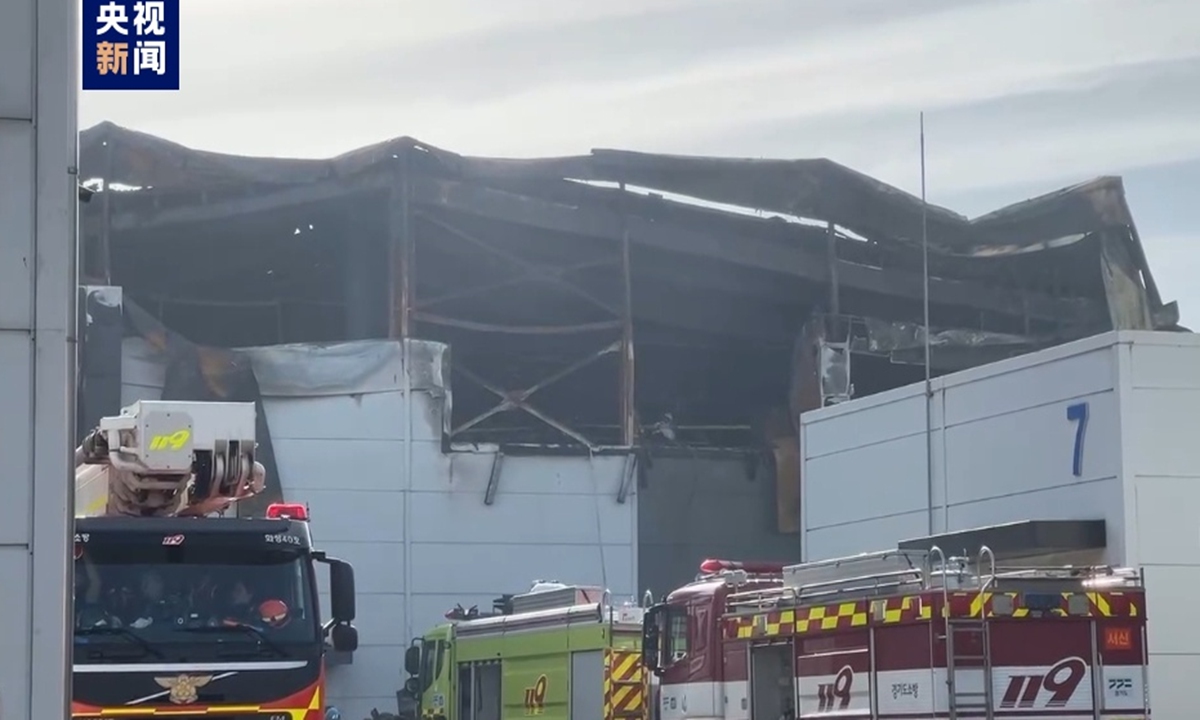
Firetrucks arrive at the fire scene at the lithium battery factory in South Korea on June 24, 2024. Photo: CCTV
Lithium battery industry insiders in South Korea have showed their condolences and reflections following a recent deadly fire at a local lithium battery factory.
Alex Kang, a representative of Korea Standard and Industry Development told the Global Times on Wednesday that "the situation is very unfortunate", saying that as South Korea is an ageing society, regulating foreign workers and finding alternative solutions is increasingly challenging.
The response came after a deadly fire that broke out at a lithium battery factory in Hwaseong, Gyeonggi Province on Monday, taking 23 lives, mostly Chinese migrant workers, the Korea Herald reported.
According to local media reports, the devastating blaze has triggered an examination of the workplace safety and industrial development across South Korea's high-tech sectors.
While sending deep sympathy and sincere condolences to the victims, Kang said, with the fastest aging population in the world and declining fertility rate, it is crucial for South Korea to actively attract overseas manpower through policy initiatives.
Additionally, the manufacturing industry is facing difficulties in obtaining labor due to changing perceptions among millennials and generation Z in South Korea who are hesitant to give birth to children.
To address this issue, the government needs to roll out policies to introduce robots and promote industrial digitalization as viable alternatives, Kang said.
As South Korea's economy is stagnating and the unemployment rate keeps rising, the inferno has sparked concerns for the country's high-tech industry, according to Chinese experts.
Despite South Korea's successes in sectors like semiconductors, electronics, and auto-making, its high-tech industry is grappling with challenges, which include an aging population, dwindling youth employment rate, a gap between education and industry needs, inadequate investment in R&D, and intense international competition. These factors are affecting the industry's ability to innovate, according to Chinese experts.
However, as an industrialized country, South Korea is generally considered to have high safety standards and working conditions. "The fire may be related to lithium batteries which are full of energy after fully charged, they can be easily impacted by dry weather and other factors, causing potential safety hazards to the workers," Wang Sheng, a professor of international relations at Jilin University, told the Global Times on Wednesday.
Lithium is used in electric vehicles, mobile phones, laptops and energy storage systems. Some 35,000 lithium batteries were estimated to be stored on the second floor of the three-story reinforced concrete factory with a total floor area of 2,300 square meters or so, according to Xinhua News Agency.
Immediately after the blaze, Chinese Ambassador to South Korea Xing Haiming visited the scene, and he urged the South Korean side to quickly investigate the cause of the fire, to handle the aftermath properly, and to provide all necessary support to the families of Chinese victims.
Many Chinese workers, especially those without valid working visas, accept jobs that South Korean workers deem undesirable. They are mainly involved in "3D" jobs - dirty, difficult and dangerous. Chinese workers are often hired across the manufacturing, construction and commercial fishing sectors.
Locals' aversion to low-paying and physically demanding 3D jobs has led to a shortage of local workers willing to take on these roles in factories. As a result, many factories in Korea have turned to hiring foreign laborers to fill these positions, Wang explained.
Chinese industry experts said the tragedy is likely to produce a negative impact on Korea's international image, saying that there had been minor fires at Hwaseong factories before, but they failed to completely ferret out the hidden risks.
As of the press time, the cause of the inferno has yet to be determined. Following the unexpected accident, share price of S Connect Co, which owns 96 percent of Aricell, where the fire broke out, plunged on Monday afternoon, ending at 1,460 South Korean won (7.64 yuan), marking a significant decrease of 22.51 percent from the previous session, according to the yicai.com.
Global Times




